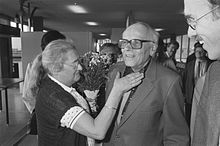Jelena Georgievna Bonner

Jelena Georgijewna Bonner ( Russian Елена Георгиевна Боннэр , scientific transliteration Elena Georgievna Bonnėr ; born February 15, 1923 in Merw , Turkestan ASSR ; † June 18, 2011 in Boston ) was a Russian politician . The pediatrician was a Soviet dissident and one of the leading human rights activists in Russia. Her second husband was Andrei Sakharov .
Life
Bonner grew up in the Hotel Lux in Moscow . Her mother was the Jewish communist Ruth Bonner, her stepfather Gework Alichanow , a leading Armenian communist and Comintern secretary. Her biological father was Levon Sarkissowitsch Kotscharow. She had a younger brother, Igor, who later became an officer in the Soviet Navy . In 1937 Bonner's parents were arrested during the Stalin purges . The father was executed in 1938, the mother banished to a Gulag camp.
Bonner graduated from high school in Leningrad and volunteered as a nurse during World War II . In 1945 she was dismissed with war injuries with the rank of lieutenant . In 1947 she began studying medicine at the Leningrad University . After graduating, she worked as a pediatrician, as a district doctor and as a freelance writer. In the 1960s, she joined a group of writers and artists who exercised the freedoms of the post-Stalinist era.
Bonner was married to Ivan Semjonow for the first time and has two children with him: Tatjana and Alexej, both of whom live in the USA.
In October 1970 she met Andrei Sakharov on the sidelines of a trial against human rights activists in Kaluga . Bonner and Sakharov married in January 1972. The marriage to the Soviet dissident changed Bonner's life. She took early retirement and devoted herself to supporting her husband's work. She became his chief of staff, his secretary, his cook and his ambassador in the world. In 1975 she represented him at the Nobel Peace Prize ceremony in Oslo , and visited Italy, France and the USA on his behalf. During the time of Sakharov's exile in Gorky , from January 1980 to May 1984 she was his only contact with Moscow and with foreign journalists. In May 1984, she was also forbidden from leaving Gorky. In August 1984, a district court sentenced her to several years' exile for “anti-Soviet propaganda”.
In the same year, Bonn had severe heart problems. Heart surgery became inevitable. Sakharov went on three hunger strikes for a total of 200 days to allow his wife to have heart surgery in the United States . In December 1985 she was allowed to travel to the USA. She underwent six bypasses in multiple open heart operations at Massachusetts General Hospital in Boston . In June 1986 she returned to the Soviet Union. In December 1986, Mikhail Gorbachev lifted Bonner's and Sakharov's exile. Both could return to Moscow and operate freely.
After Sakharov's death in December 1989, Bonner continued her human rights activities. In August 1991, she joined the defenders of the Russian parliament against a communist coup . She supported the Russian President Boris Yeltsin during the constitutional crisis of 1993 and was appointed by him to the Human Rights Commission. In 1994 she gave up her seat on the body in protest against Russia's Chechnya policy. She wrote regularly about human rights and democracy in Russia in Russian and US newspapers . She campaigned for the right to self-determination in the disputed Nagorno-Karabakh region and for the peoples of the former Soviet Union.
In 1991 Jelena Bonner received the Thorolf Rafto Memorial Prize , in November 2000 she was awarded the Hannah Arendt Prize for Political Thought in Bremen . On March 10, 2010, she signed a manifesto for the Russian opposition entitled “ Putin must go ”. Jelena Bonner died after a long illness on June 18, 2011 in her home in Boston.
Publications (selection)
- Mothers and Daughters, Memories of My Youth 1923 to 1945 , Piper, Munich 2003.
- United in loneliness: my years with Andrei Sakharov in exile , Munich, Zurich: Piper, 2nd edition 1991, ISBN 3-492-11522-5 .
literature
- Bonner, Elena. In: Jews in Russia (USSR) / Jews in political and cultural life . In: Short Jewish Encyclopedia . Supplementary Volume 2, pp. 208–209, Jerusalem 2005 (in Russian)
Web links
- Jelena Bonner: On the ruins of totalitarianism, Hannah Arendt Prize Speech 2000 (de)
- Literature by and about Jelena Georgijewna Bonner in the catalog of the German National Library
Individual evidence
- ↑ On the death of Jelena Bonner, she never gave up
- ↑ Winner of the Rafto Prize , on the Rafto Foundation website, accessed on April 22, 2018.
- ↑ Former Soviet dissident Jelena Bonner dead
| personal data | |
|---|---|
| SURNAME | Bonner, Jelena Georgievna |
| ALTERNATIVE NAMES | Елена Георгиевна Боннер (Russian) |
| BRIEF DESCRIPTION | Soviet dissident, Russian human rights activist |
| DATE OF BIRTH | February 15, 1923 |
| PLACE OF BIRTH | Mary , Turkmenistan |
| DATE OF DEATH | June 18, 2011 |
| Place of death | Boston |